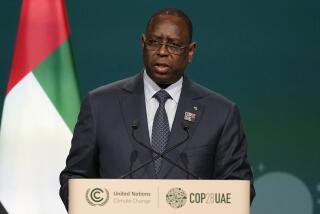Nigeria Annuls June 12 Election; U.S. Assails Move
- Share via
WASHINGTON — In a step that drew an almost instantaneous rebuke from the Clinton Administration, Nigeria’s military dictatorship annulled the June 12 presidential election Wednesday and canceled plans to return Africa’s most populous nation to civilian rule.
Describing the election as “orderly, fair and free from any serious irregularities,” State Department spokesman Mike McCurry said the Administration will suspend a $22.8-million-a-year aid program and is reconsidering all other aspects of U.S.-Nigeria relations to pressure the regime to restore democracy.
Gen. Ibrahim Babangida revoked the election results even though both candidates and their political parties had been approved in advance by his military regime.
At a meeting with his fellow generals in Abuja, the administrative capital, Babangida withdrew his pledge to turn power over to a civilian president Aug. 27.
Billionaire industrialist Moshood K.O. Abiola, a friend of Babangida, was the apparent winner in the election, defeating another rich businessman, Bashir Tofa. But the high court in Abuja ordered the results suppressed June 15 after supporters of the military government charged that the election was marked by irregularities.
“These steps were taken to save our judiciary from being ridiculed and politicized locally and internationally,” Babangida’s decree said, using the court’s involvement to explain the regime’s decision.
The U.S. government scoffed at the charges of electoral fraud.
“According to independent Nigerian monitoring groups and outside observers, the election was orderly, fair and free from any serious irregularities,” McCurry said. “The Nigerian press, public and leading civilian politicians view the election as the most successful in Nigeria’s history and have called upon the military to release and respect the results.
“The failure on the part of the military regime to respect the will of the Nigerian people . . . will have serious implications for U.S.-Nigerian relations,” he added. In addition to suspending foreign aid, McCurry said that the Administration is re-examining all other aspects of the relationship to find pressure points that might cause Babangida to reverse course and permit a civilian government to take office.
McCurry expressed some regret about the aid cutoff because most of the money was earmarked for “public health, child survival, AIDS prevention and other issues that we believe are very important for the people of Nigeria.” That Washington would take such a step, he said, “indicates the seriousness with which we regard” cancellation of the election.
Britain also condemned the military government and hinted that it may break diplomatic relations with its former colony. U.S. diplomats also urged France and Germany to take action against the military regime.
The military overthrew Nigeria’s last civilian government Dec. 31, 1983. In recent years, Babangida has often talked about restoring democracy but always stopped short of doing so. Nigeria has been under a succession of military dictatorships for 23 of the 33 years it has been an independent state.
A potentially rich nation with a population of 88.5 million and ample reserves of oil, Nigeria has suffered since independence from widespread government corruption and mismanagement. Time and again, the military has ousted corrupt civilian regimes only to engage in abuses of its own. Although the country is a major oil exporter, its foreign debt stands at $27.5 billion.
The Associated Press reported from Abuja that activist groups said they will organize nationwide strikes and protests, but there were no immediate demonstrations. The government threatened to impose a state of emergency if there is any significant unrest.
But the State Department, citing reports of civil disturbances in Lagos, on Wednesday night urged U.S. citizens to defer unnecessary travel to Nigeria.
Many Nigerians, made cynical by decades of military coups and unfulfilled promises of democracy, greeted the voiding of the election numbly, the AP said.
“People are disturbed and worried, but on the whole nobody wants to compound the crisis,” said Salisu Muhammad, spokesman for the National Labor Congress in Lagos, Nigeria’s main city.
More to Read
Sign up for Essential California
The most important California stories and recommendations in your inbox every morning.
You may occasionally receive promotional content from the Los Angeles Times.













